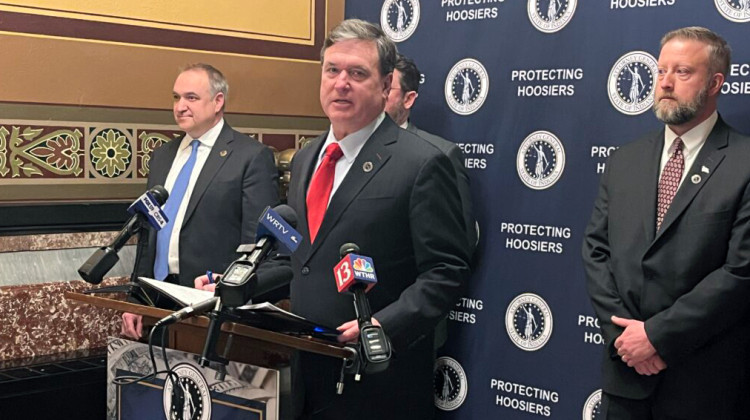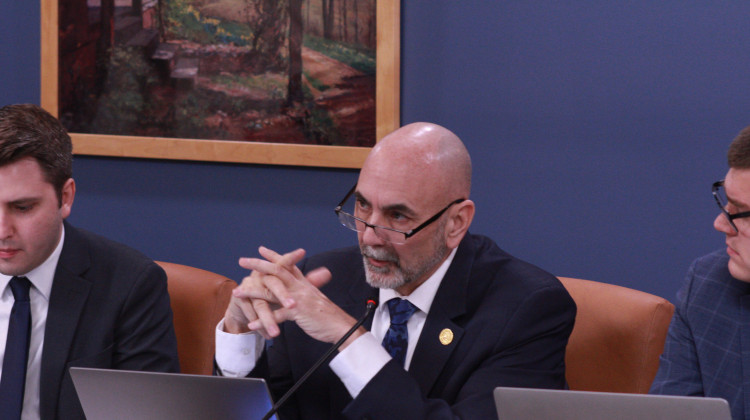
Sen. Fady Qaddoura (D-Indianapolis) raised concerns about the Aged and Disabled waiver waitlist. He said he’s concerned that people who are deemed medically eligible for waiver services may be forced to wait just because of a budget limitation.
Brandon Smith / IPB NewsThere’s just over a month left before several significant changes to the state’s Medicaid program go into effect, including changes to the Aged and Disabled waiver and the implementation of the Pathways for Aging program.
Several lawmakers raised concerns about the Family and Social Services Administration's handling of the changes at a Medicaid Advisory Committee meeting Wednesday.
Continuing fallout from Medicaid 'forecasting error'
In January, FSSA released a list of changes and “initiatives” in response to the state’s $1 billion Medicaid shortfall.
As a part of that announcement, FSSA said family caregivers will no longer be able to provide attendant care — instead shifting to the Structured Family Caregiving program on July 1. This would shift people on the Aged and Disabled waiver under the age of 60 to the Health and Wellness waiver.
Sen. Shelli Yoder (D-Bloomington) said families of medically complex children haven’t had enough time to prepare for the “massive change” that was announced at the beginning of the year.
“I am hearing on a regular basis from people in my district, they don't know what's going on,” Yoder said. “They haven't had clear communication. And I think it's just strictly because we're moving too quickly. We've had to move so fast.”
READ MORE: Lawsuit alleges FSSA 'failed' its duty to provide medically complex children care
Yoder said the state hasn’t given families the courtesy and communication that they are owed.
One of the other changes announced in January was the possibility of implementing a waitlist for the Aged and Disabled waiver.
In April, FSSA announced the waiver reached the maximum capacity of “slots,” meaning people looking to receive services through the waiver will have to wait for a new slot to open.
Sen. Fady Qaddoura (D-Indianapolis) said he’s concerned that people who are deemed medically eligible for waiver services may be forced to wait just because of a budget limitation.
“As state employees and as legislators, we are viewed by the public as we have the power to make changes, and the waitlist is problematic,” Qaddoura said. “Even the term waitlist for people who need services is problematic to communicate and explain to the public.”
The state has 50,600 slots for the Aged and Disabled waiver. On July 1, that number will increase to 55,000, with the new slots split between the Pathways for Aging program and Health and Wellness waiver.
That doesn’t mean the number of slots open on July 1 is limited to the 4,400 new ones. According to the Indiana Medicaid Director Cora Steinmetz, the Centers for Medicare and Medicaid Services only allows slots to open back up at the beginning of a fiscal year — meaning if someone becomes ineligible or moves out of the state that slot remains “filled” until the fiscal year ends.
In July, those slots will also become available.
However, lawmakers raised concerns that, even with the additional slots, it won’t be enough.
“These individuals are now being put in a very difficult position,” Qaddora said. “There are real life implications for citizens and providers.”
Rep. Ed Clere (R-New Albany) said it sounds like the state might start out with few — if any — available slots “right out of the gate.”
“We're already someplace, maybe somewhere close to bumping up against the number of additional waiver slots — especially depending on how they're apportioned between the two waiver programs,” Clere said.
Steinmetz said the state is dedicated to providing care in a sustainable manner.
“We are optimistic that if we can employ some of these other sustainability strategies as it relates to the the waiver, we will be in a much better position that we can remove waitlists in the future and ensure that we have access to these services,” Steinmetz said.
Steinmetz said a majority of states have a waitlist for these types of waivers. Qaddoura pushed back and said he doesn’t mind challenging the status quo.
“It doesn't really incentivize me that other states are doing it in a certain way,” Qaddoura said. “But as a legislator, I try to walk in the shoes of a family that is struggling, that needs these services, and they are on a waitlist. And it's perplexing that it's a budget issue. It's perplexing that there’s a waitlist. It's difficult for me as a legislator to go to my community and say, ‘You know what? Sorry, you're on a waitlist for eight months.’”
Steinmetz said the agency would be sharing more information in the future.
Pathways for Aging transition
Indiana will also transition to managed care health plans for Medicaid members 60 years or older on July 1.
The Pathways for Aging program will shift care to managed health plans from the fee-for-service structure the state has been using. That transition has been rocky so far, negotiations over case management rates broke down last month.
Currently, case management for the Aged and Disabled waiver was handled by the state’s Area Agencies on Aging. With the Pathways for Aging program, the managed care entities in charge of the health plans are also responsible for case management or service coordination.
A network of Area Agencies on Aging formed to create Community Care Hub Indiana, which would help facilitate a contract with managed care entities (MCEs). However, with the transition, FSSA proposed a new rate for case management services that was significantly lower than the previous rate. Community Care Hub Indiana couldn’t reach an agreement due to the low rate.
While Area Agencies on Aging can enter into individual contracts with the companies, many can’t afford the lower rate because it isn't enough to cover the cost of the work.
Medicaid officials said half of the state’s Area Agencies on Aging said they were not open to contracts for care management and service coordination.
Clere asked Medicaid officials about concerns around the service coordination aspect of the program.
“I don't know how we can say we're ready if we're still in chaos around service coordination,” Clere said.
Join the conversation and sign up for the Indiana Two-Way. Text "Indiana" to 765-275-1120. Your comments and questions in response to our weekly text help us find the answers you need on statewide issues.
Steinmetz said while contract negotiations continue, Medicaid officials are monitoring staffing levels for service coordination.
“We have been very direct with the MCEs that on July 1st, they have a contractual obligation to ensure the caseload ratios are met for service coordination,” Steinmetz said.
Steinmetz said from the moment that Community Care Hub Indiana “opted not to participate as a network,” the state made it clear that the MCEs had to make a “good faith effort” to develop individual contracts with as many Area Agencies on Aging as possible. The insurers could also develop contracts with independent care management companies interested in participating in the Pathways for Aging program.
Clere also said he heard one MCE, Anthem, was requiring Area Agencies on Aging to sign non-disclosure agreements — which he was against.
“I don't know what authority you feel you have — that the office has, to intervene,” Clere said. “But it flies in the face of transparency, including a lot of legislative discussions around health care costs in recent years. It is simply unacceptable.”
Medicaid officials said NDAs might have been required to protect “proprietary information.” Clere said if that was the case, the agreements should be narrowed.
“A broad NDA only benefits Anthem at the expense of not only the [Area Agency on Aging], but the consumers the [Area Agency on Aging] is serving and the state,” Clere said. “Transparency should be a top priority.”
Pathways for Aging is set to launch on July 1.
Abigail is our health reporter. Contact them at aruhman@wboi.org.
 DONATE
DONATE






 Support WFYI. We can't do it without you.
Support WFYI. We can't do it without you.